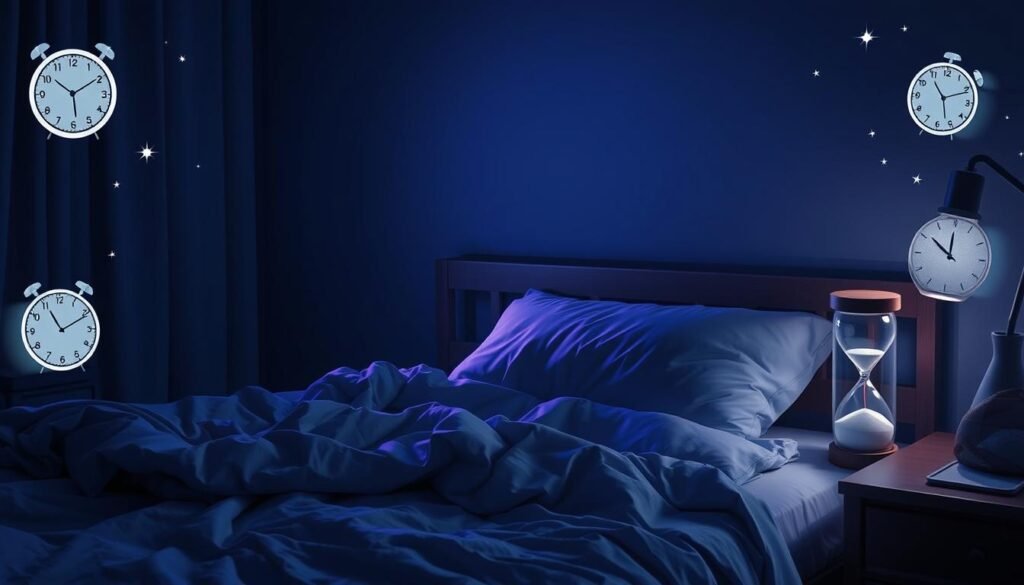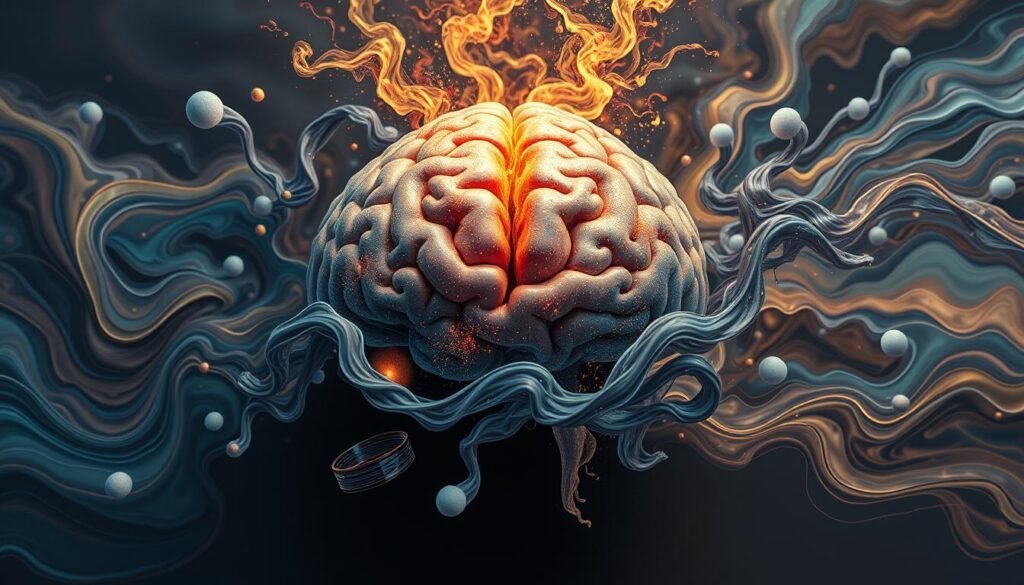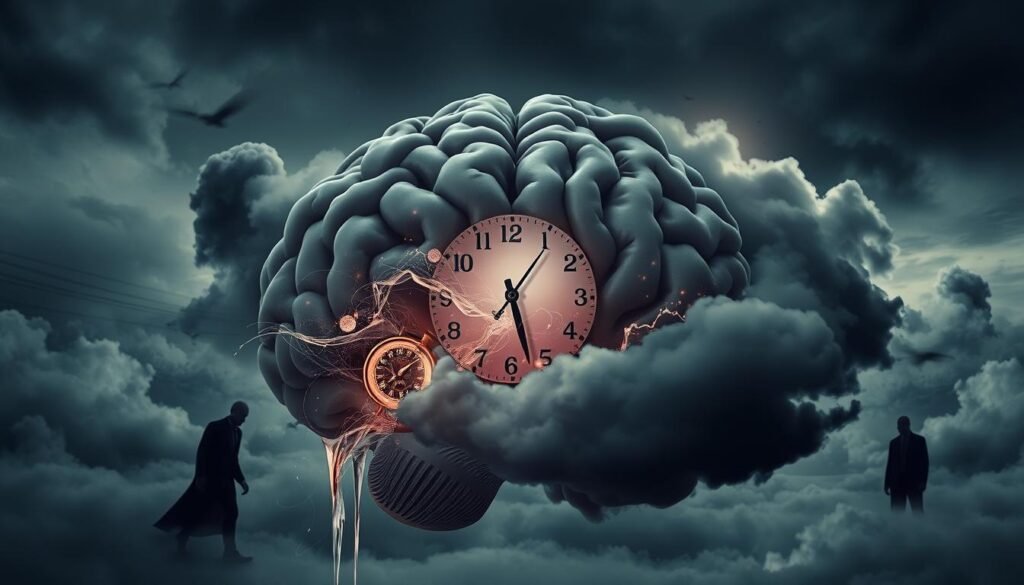Around 25 percent of people with insomnia have primary insomnia. This type deeply affects everyday life. Chemical imbalances, particularly with neurotransmitters, play a critical role. Studies show GABA levels are 30 percent lower in those with chronic primary insomnia. This connection between brain chemistry and sleep is crucial. Knowing about these imbalances can help find new treatments for insomnia.
Key Takeaways
- Approximately 25% of insomnia cases are classified as primary insomnia.
- Low levels of GABA can exacerbate sleep disorders.
- Nearly 50% of individuals over 60 experience insomnia symptoms.
- Insomnia significantly affects mood, concentration, and overall health.
- Chemical imbalances can hinder effective treatment for sleep disorders.
- Understanding neurotransmitter roles is crucial for addressing insomnia.
Understanding Insomnia
Insomnia affects many people, disturbing their normal sleep patterns. This condition makes it hard to fall asleep or stay asleep during the night. It shows up in two main types: acute and chronic. Acute insomnia happens due to stress and lasts a few days to weeks. Chronic insomnia goes on for months or years, usually caused by deeper issues.
Sleep disorders greatly impact everyday life. A lack of sleep harms health and makes stress harder to handle. Some think catching up on sleep during weekends helps, but it doesn’t fully fix sleep loss. Kids and teens need about 9.5 hours of sleep, whereas adults need 7-9 hours for best health. But, changes like longer work hours and non-stop entertainment cut into sleeping time.
- Babies need 16-18 hours of sleep for growth and development.
- School-age children typically require approximately 9.5 hours each night.
- Most adults generally need 7-9 hours of sleep per night.
- Chronic stress can lead to elevated cortisol levels, affecting sleep quality.
- Herbal remedies like Holy Basil and reishi can help manage stress and improve sleep health.
Technology also helps in managing sleep problems. Many use apps and wearable devices to track their sleep. This has made more people aware of insomnia. It’s encouraging to know that treatments like GABA, tryptophan, and melatonin can help. Over half of those treated at clinics see improvements.
Types of Insomnia
Learning about different types of insomnia helps find the root cause and a good cure. Roughly one-third of people will face insomnia at some point. There are two main kinds: primary insomnia and secondary insomnia.
Primary insomnia stands alone, not caused by another health problem. On the other hand, secondary insomnia is tied to other issues. These could be medication reactions, hormone changes, or mental health conditions. Insomnia is also classified by how long it lasts—either acute or chronic.
| Type of Insomnia | Characteristics |
|---|---|
| Primary Insomnia | Not related to any other health issue; often presents as a long-term problem with no identifiable cause. |
| Secondary Insomnia | Occurs due to underlying conditions like anxiety, depression, or medical issues. |
| Acute Insomnia | Short-term; triggered by stress, illness, or environmental factors, typically lasts less than a few weeks. |
| Chronic Insomnia | Long-term; experienced three or more nights per week for over three months, often related to persistent health issues. |
Knowing the specific type of insomnia is key to getting the right treatment. For those struggling with insomnia, many options exist to ease symptoms. This includes changing lifestyles and seeking therapy. Getting to know these categories is crucial for managing the condition well. More tips on treating insomnia can be found in this detailed guide.
What Causes Chemical Imbalance That Causes Insomnia
Understanding what leads to a chemical imbalance is key for better sleep. Neurotransmitters play a big part in our sleep patterns. GABA, serotonin, and melatonin are very important for a good night’s rest. When their levels are off, falling or staying asleep becomes hard.
Overview of Neurotransmitter Roles in Sleep
Neurotransmitters send signals in the brain. GABA helps calm the brain and get our bodies ready for sleep. If we don’t have enough GABA, sleep problems can happen. This has been seen in studies, where people with insomnia had much lower GABA function.
Serotonin helps control our mood and is needed for sleep. It changes from L-tryptophan in two steps, showing its role in keeping a good chemical balance. If this balance is off, sleep issues can get worse, making it harder for those affected.
Common Chemical Imbalances Linked to Insomnia
Many people with insomnia might have a chemical imbalance. Over 80 percent of Americans could face these neurotransmitter changes, disturbing their sleep. Studies show people with healthy sleep patterns have up to thirty percent more GABA function than those with insomnia. Hormonal shifts, like postpartum depression affecting 10-15% of women, can also make insomnia worse. Knowing about these imbalances can help find the right treatment. For more on how chemical imbalances affect mental health, check Healthline.
The Role of GABA in Sleep Disorders
GABA, or gamma-aminobutyric acid, is key for good sleep. It acts as the brain’s main inhibitory neurotransmitter. This means it helps calm the brain’s activity. Studies have found that changes in GABA levels are common in those with insomnia, leading to major sleep issues.
How GABA Functions as a Brain Inhibitor
GABA helps reduce how active neurons are across the nervous system. This reduction is crucial for sleep quality. For instance, kids with obstructive sleep apnea often have unusual GABA levels. This might relate to stress, causing sleep disruptions.
Low GABA Levels and Insomnia Correlation
Research showed people with primary insomnia had about 30% lower GABA levels. This deeply affects their ability to sleep well. When sleep dropped under six hours, these levels fell in key brain areas. This influences emotional control and decision-making.
Boosting GABA can temporarily ease insomnia, but balance is key. High GABA levels linked to sleep issues mean managing stress is crucial. Making changes like exercising, eating differently, and trying therapy can help manage GABA-related sleep problems.
| Factors | Effects on GABA Levels | Implications for Sleep |
|---|---|---|
| Insomnia | Reduction by ~30% | Increased difficulty achieving sleep |
| Obstructive Sleep Apnea | High urinary GABA levels | Potential for insomnia due to stress response |
| Sleep Duration | Lower GABA levels | Negative impact on immune function and cognitive abilities |
| Gabapentin Treatment | Increases GABA levels | May reduce stress response impacts on sleep |
Neurotransmitter Imbalance and Its Impact on Sleep
It’s essential to understand how neurotransmitter imbalances affect sleep to tackle insomnia. We’ll look at serotonin dysregulation and how norepinephrine plays a part in sleep issues.
Serotonin Dysregulation and Its Effects on Sleep Patterns
Serotonin impacts mood and sleep. Low serotonin can change sleep cycles a lot. Researchers have found that problems with serotonin can cause insomnia and mess with our sleep clocks.
This issue can also lead to sleep apnea. This shows imbalance hurts sleep quality. Knowing about serotonin points to its role in fighting insomnia symptoms.
The Connection Between Norepinephrine and Insomnia
Norepinephrine affects our sleep too. High levels, often from stress, keep us too alert to sleep. This can mess up our sleep patterns and make insomnia worse.
Learning how norepinephrine imbalance impacts sleep is key to treatment. If you’re battling insomnia, managing norepinephrine might help you sleep better.
| Neurotransmitter | Role in Sleep | Impact of Imbalance |
|---|---|---|
| Serotonin | Regulates mood and sleep cycles | Causes insomnia and disrupted sleep |
| Norepinephrine | Increases alertness and stress response | Complicates sleep initiation and maintenance |
| GABA | Inhibits neural activity, promoting sleep | Low levels can lead to insomnia |
| Glutamate | Excites brain activity | Excess can disrupt sleep patterns |
For people with sleep problems, understanding neurotransmitters like serotonin and norepinephrine is crucial. Finding the right help can fix the balance and ease symptoms. For more info on this topic, check out this detailed study on neurotransmitter functions.
Melatonin Deficiency and Sleep Health
Understanding how melatonin deficiency affects sleep is crucial. Melatonin is key for our circadian rhythms, affecting our sleep-wake cycle. Changes in melatonin levels can be due to various factors, including age. After 40, melatonin levels decline, which can mess up sleep patterns.
How Melatonin Regulates Circadian Rhythms
Melatonin tells our body when to sleep, mainly at night. But, light at night can stop melatonin production. This makes sleeping hard. People over 90 have much less melatonin than younger folks. A lack of melatonin might cause sleepiness during the day, waking up at night, and messed-up sleep schedules. This can lead to sleep problems like insomnia and depression.
Strategies to Increase Melatonin Production
Boosting melatonin can help sleep. Here’s how:
- Keep a regular sleep schedule.
- Less screen time before bed helps.
- Dim lights in the evening are good.
- Small doses of melatonin supplements may help, with research suggesting 0.1–0.3 mg/d is enough.
Tackling melatonin deficiency this way improves sleep. For more info on melatonin deficiency, check this source.

Circadian Rhythm Disruption as a Cause of Insomnia
Circadian rhythms are like an internal clock, guiding our sleep and wake times. Changes in these rhythms can hurt sleep and general health. Circadian rhythm disruption, especially from blue light from screens, can mess with sleep. It does this by lowering melatonin, a sleep hormone, leading to insomnia.
Effects of Light Exposure on Sleep Quality
Controlling light exposure helps maintain good sleep habits. Here, we explore how light affects our body’s clock and sleep:
- Blue light at night can make falling asleep harder and shorten sleep duration.
- Lack of a regular sleep schedule leads to social jetlag, troubling 87% of Northern Europeans and worsening insomnia.
- The irregular hours of shift work upset our natural circadian rhythms. This issue affects about 15% of U.S. workers, causing long-term sleep problems for many.
Knowing how circadian rhythm disruption impacts us is key. To improve sleep quality, try to reduce screen time at night. Use blue light filters and keep a regular sleep schedule. Doing these can help fix some sleep issues caused by light exposure.
The Impact of Hormonal Imbalances on Sleep
Hormonal imbalances can greatly affect sleep quality. This is especially true with stress hormones. Cortisol, the stress hormone, often disrupts sleep, especially when we feel stressed out. It’s key to understand this to manage sleep problems well.
How Stress Hormones Affect Sleep Quality
Long-term stress can raise cortisol levels, messing with sleep patterns. Folks under constant stress might struggle to find good sleep. Sleep problems can make heart disease and mental issues worse because of these hormonal disruptions. Using stress management techniques can help balance hormones and improve sleep habits.
Women’s Health: Menopause and Sleep Disorders
Menopause brings big hormonal changes that often lead to insomnia. A 2020 study showed that insomnia is very common during menopause. Shifts in estrogen and progesterone affect sleep. Thyroid imbalances, like hypothyroidism, can also cause sleep trouble. It’s crucial for women going through menopause to watch their hormone levels carefully.

Anxiety Disorders and Sleep Disruption
Anxiety disorders are a big problem for sleep, affecting millions in the United States. Many with insomnia are trapped in a cycle. Anxiety makes it hard to fall asleep, which makes them feel helpless. This messes up their sleep and makes them too alert to relax and sleep well.
How Anxiety Interferes with Sleep Patterns
Many with insomnia also have anxiety disorders – estimates show 24% to 36%. Those with hypersomnia face anxiety too, with rates from 27% to 42%. They may feel restless and worry a lot. These feelings make sleeping well very hard.
To deal with anxiety and sleep problems, you must look at mental and physical health. Techniques like relaxing, keeping a regular sleep time, and getting help improve sleep. Mental health is key for good sleep. You can learn more about handling anxiety and sleep here.
| Condition | Prevalence of Anxiety Disorders |
|---|---|
| Insomnia | 24% – 36% |
| Hypersomnia | 27% – 42% |
The link between anxiety and bad sleep is a big mental health issue. It shows we need to focus on fixing this. Knowing this helps people deal with anxiety and its effects on sleep better.
Depression Symptoms and Insomnia
Insomnia is both a sign and a cause of depression. It’s important to understand their link. Studies show a connection between insomnia and depression. For instance, 20% of people with insomnia might get depression later.
Those with insomnia are at a higher risk of depression. It shows the need to focus on sleep when dealing with depression.
The Bidirectional Relationship Between Sleep and Depression
Three out of four people with depression struggle with insomnia too. This suggests sleep and depression affect each other. Poor sleep can make depression worse. Recognizing this link is crucial.
People with sleep apnea are especially at risk. About 20% of those with depression have sleep apnea. One in seven may deal with hypersomnia. This makes treating sleep issues important in depression care.
Insomnia and depression can create a tough cycle. Emotions can get worse as sleep decreases. Treatments often include therapy and medicines, like SSRIs and SNRIs. Some drugs and methods directly improve sleep.
Trying non-drug strategies is also helpful. Things like relaxation exercises and using the bed only for sleep can help. Focusing on both depression and sleep is key for getting better.

Chronic Stress and Its Effects on Sleep Quality
Chronic stress badly affects how well we sleep, often causing insomnia. It results in higher levels of cortisol. This hormone, when too high, messes up our sleep. People with ongoing stress may have trouble sleeping well. They might wake up often or find it hard to fall asleep.
Constant stress triggers the HPA axis in our bodies. This action increases cortisol levels by evening. High cortisol makes getting to sleep hard. It also makes it tough to reach REM sleep, which is vital for feeling rested. Stress doesn’t just make sleep hard. It can lead to mental and physical health problems.
Knowing how chronic stress affects sleep helps us manage it better. Using mindfulness, relaxation, and physical activity helps lower stress. Such methods improve sleep and fight insomnia caused by stress.
| Stress Management Techniques | Benefits |
|---|---|
| Mindfulness Meditation | Reduces anxiety and improves overall mental health |
| Deep Breathing Exercises | Immediate relaxation response, aiding in sleep onset |
| Regular Physical Activity | Enhances mood and regulates sleep cycles |
| Yoga and Stretching | Promotes relaxation and prepares the body for sleep |
| Cognitive Behavioral Therapy (CBT) | Addresses underlying issues contributing to chronic stress and insomnia |
To sum up, it’s key to deal with chronic stress to sleep better and beat insomnia. By using good stress management methods, one can return to natural sleep patterns. This improves overall health.
Treatment Options for Insomnia Related to Chemical Imbalances
There are various ways to treat insomnia caused by chemical imbalances. Two main treatments include specific drugs and cognitive therapy. Both aim to fix the root problems that affect sleep.
Cognitive Behavioral Therapy as a Solution
Cognitive behavioral therapy (CBT) is a well-known drug-free method to tackle insomnia from chemical imbalances. In sessions, patients learn to change negative thoughts and actions that harm their sleep. They get to try techniques like:
- Sleep restriction to improve sleep efficiency
- Stimulus control to condition the mind for better sleep
- Cognitive restructuring to challenge unhelpful beliefs about sleep
- Relaxation techniques to reduce anxiety and prepare for rest
CBT not only helps with sleep but also deals with emotional and thinking issues caused by brain chemical imbalances.
Medications That Address Chemical Imbalances
For some, doctors may suggest medicines to balance brain chemicals for sleep. Common meds include:
| Medication Type | Target Neurotransmitter | Typical Use |
|---|---|---|
| Benzodiazepines | GABA | Short-term relief for severe insomnia |
| Non-benzodiazepine sleep aids | GABA | Management of sleep onset and maintenance |
| Antidepressants (e.g., Trazodone) | Serotonin | Improvement of sleep quality in patients with depression |
| Melatonin receptor agonists | Melatonin | Circadian rhythm regulation |
Talking to healthcare experts is crucial to get a custom plan. It may mix therapy and meds. This way, it can better tackle insomnia from chemical imbalances.
Conclusion
It is crucial to understand how a chemical imbalance affects insomnia and sleep problems. Studies reveal that things like neurotransmitter issues and hormone changes play a part. Also, genes might make insomnia and depression happen together for many people.
People with insomnia can try different ways to get better. Changing what you eat, practicing mindfulness, and reducing stress can help. Also, treatments that fix chemical imbalances, like taking GABA or melatonin, can improve sleep.
In conclusion, solving the main causes of insomnia can help you sleep better at night. This improves your life quality. Everyone should look for treatment options that fit their needs. Don’t hesitate to get help from experts for sleep issues.